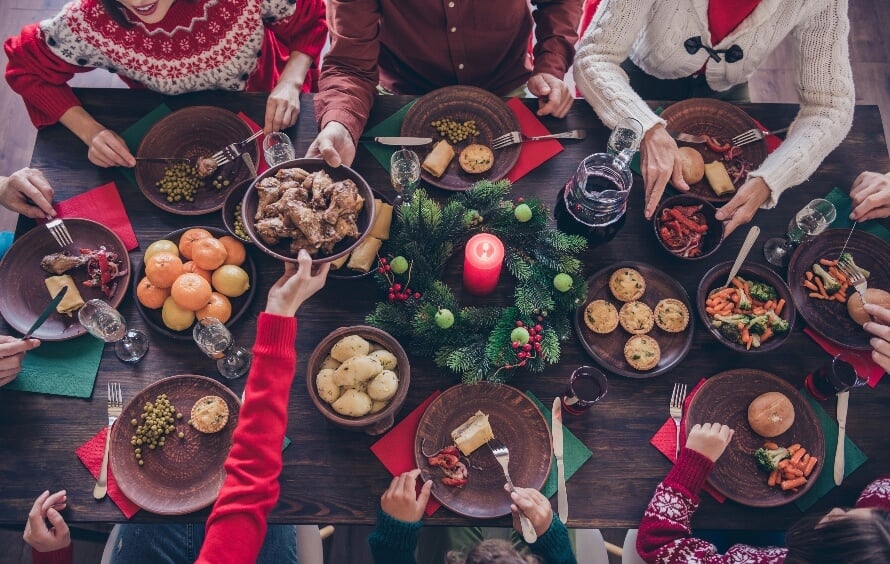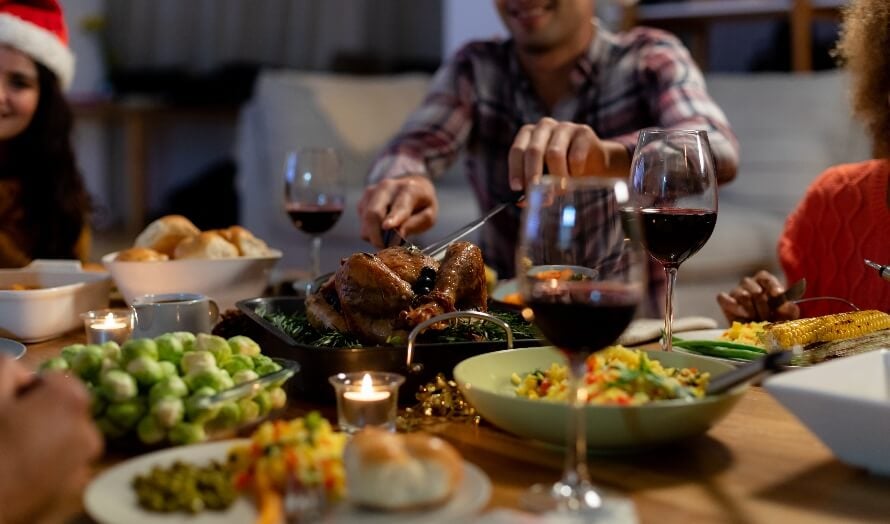Holiday weight gain—it’s a term that sends shivers down the spines of fitness enthusiasts and dieters alike.
People brace themselves for the “inevitable:” gaining 5, 10, or even more pounds of “winter weight” by the time January rolls around.
But do the stories about average holiday weight gain actually hold up?
Not even close.
Most people only gain 1-to-2 pounds of fat during the holidays. And here’s the kicker—it’s easy to avoid or lose that weight if you know what you’re doing.
Forget the tired advice about skipping seconds and eating bland food.
In this article, you’ll learn eight simple and effective ways to keep holiday weight gain in check without giving up the treats you love.
Key Takeaways
- Most people only gain 1-to-2 pounds of fat during the holidays, not the 5 or 10 pounds often feared.
- Avoid holiday weight gain by eating one or two large meals per day and skipping snacks.
- Prioritize protein to curb hunger, reduce cravings, and limit overeating.
- Staying active during the holidays helps burn calories, reduce appetite, maintain fitness habits, and keep your mind off food.
- You can quickly reverse any winter weight gain with proper dieting and exercise in just a few weeks.
- What’s the Average Weight Gain During the Holidays?
- 8 Simple Ways to Beat Holiday Weight Gain
Table of Contents
+
What’s the Average Weight Gain During the Holidays?

The idea that people gain 5, 10, or more pounds of body fat during the holidays has become a near-universal belief.
Research, however, tells a different story.
Most studies agree that the average holiday weight gain is about 1-to-2 pounds.
For example, a study published in the New England Journal of Medicine tracked 195 people from September to March and found most gained about 1 pound, on average, between mid-November and mid-January.
Other studies show similar results: most people gain around 1-to-1.5 pounds during the holidays, which is barely enough to notice.
That said, averages don’t tell the full story.
Overweight people tend to gain more than leaner folks. In the same study of 195 adults, 14% of participants gained 5 or more pounds during the 6-week holiday period. These people were also more likely to have been overweight at the start of the study.
It’s also important to remember that while 1 or 2 pounds of winter weight gain may seem minor, many people never lose this weight, and over the years, these small increases add up.
The good news?
With the right approach, you can avoid or quickly reverse any holiday weight gain.
Here’s how . . .
8 Simple Ways to Beat Holiday Weight Gain
You’ve likely heard the usual advice for avoiding gaining weight in winter:
- Limit your food choices.
- Eat bland, less appetizing foods.
- Be mindful of portions.
- Wait 20 minutes before getting seconds.
- Avoid sugary snacks.
And while these tips can help you avoid overeating, they often fall apart during the holidays. After all, part of the joy of the season is relaxing your guard and savoring the moment—not obsessing over every bite.
Instead of rehashing tired advice that crumbles at the sight of a holiday feast, here are eight effective ways to keep holiday weight gain in check—without missing out on the treats you love.
1. Expect to gain some weight.
The best way to avoid excessive holiday weight gain is to set realistic expectations.
You’ll likely gain a few pounds, but most of it won’t be fat. Instead, it’ll come from extra water, glycogen, and food in your stomach. Don’t panic if the scale jumps after a big meal—it’s normal, and most of that weight will disappear within a week of returning to your usual diet.
Some of it might be fat, but even then, it’s nothing you can’t lose quickly with proper dieting and exercise.
The real problem isn’t gaining a little weight—it’s overreacting to it. Many people see a higher number on the scale and think, “I’ve blown it,” then throw caution to the wind, binge, and undo weeks of progress.
Ironically, research shows people who try to follow ultra-strict dietary rules are more likely to fail. Those who set rigid goals like “no sugar,” “no eating after 7 p.m.,” or “1,500 calories a day, except on Christmas,” often end up bingeing when they can’t stick to their plan.
Instead, treat the holidays as a “diet break” rather than a series of “cheat days.” Indulge a bit more than usual while maintaining keystone healthy habits (you’ll learn about these soon).
Relax, enjoy yourself, and don’t sweat a little extra weight. Most of it will vanish once you’re back on track, and any lingering fat is easy to burn off with a few weeks of focused effort.
2. Focus on things other than food.
Food plays a big role in the holidays, and sharing meals with loved ones is something to savour, not stress over.
If you make food the center of your holiday experience, you’ll likely eat more than you should. Instead, think of it as a complement to the festivities, not the main event.
Don’t deprive yourself for days, obsessing over how to “spend” your calories. Similarly, don’t try to eat like a runway model while everyone else indulges. Both approaches lead to an unhealthy fixation on food.
Instead, channel your energy into holiday traditions like picking out presents, decorating the tree, visiting friends, and so forth.
3. Create a calorie buffer.

When it comes to holiday feasts, fitness enthusiasts typically fall into two camps:
- Eat low-calorie, filling snacks throughout the day. This strategy helps curb hunger and reduce the urge to overeat during the main meal.
- Eat as little as possible—basically only protein—before the big meal. This approach creates a calorie “buffer” so that even if you indulge, your total intake for the day stays reasonable.
Which method works best depends on your preferences and experience. If you’re new to structured dieting, option #1 may feel more natural. It lets you stick to familiar habits, like eating balanced meals or snacks, while enjoying the holidays.
If you’re experienced with meal planning and managing your calorie intake, option #2 might be more effective. By front-loading your protein intake and minimizing other calories, you can enjoy your holiday meals guilt-free.
This doesn’t contradict the earlier advice about not obsessing over food.
Eating lightly before a big meal takes minimal effort and pays off with reduced fat gain. Plus, let’s be honest—snacking on carrot sticks before a feast isn’t going to stop you from devouring dessert.
If you choose option #2, a good rule of thumb is to eat about 50% of your daily protein target before the big meal. For example, if your goal is 200 grams of protein per day, aim for 100 grams earlier in the day.
If you still feel hungry despite eating this much protein, eat some fibrous fruits and vegetables like apples, oranges, strawberries, and melon to tide you over.
4. Eat big meals, skip snacks.
A great way to avoid holiday weight gain is to focus your eating on one or two big meals and avoid grazing throughout the day.
People who stick to larger meals tend to consume fewer calories overall, while those who snack on cookies, pastries, chocolates, and fatty appetizers often eat far more than they realize. A few bites here and there add up quickly, especially when paired with high-calorie drinks like eggnog or cocktails.
Why does this happen?
Grazing makes it easier to rack up calories. For example, eating 3,000 calories in a single sitting is challenging, but spreading 4,000 calories across a day of snacking feels effortless.
By limiting yourself to a single large meal, you naturally curb how much you can overeat in one sitting.
If you want to enjoy holiday treats without overdoing it, indulge in one big, calorie-dense meal and avoid snacking before or after.
If you want to have more than one large meal per day, that’s fine, but you’ll need to be more conscientious about how much and what you eat if you want to avoid gaining too much fat.
5. Prioritize protein.
Tempting treats surround you during the holidays—cookies, pastries, chocolates, and candies all vying for your attention.
One of the best ways to resist their siren song is to not be hungry, and one of the best ways to do that is to eat lots of protein.
In fact, it’s often smart to eat even more protein than usual during the holidays. Protein may help suppress appetite and prevent overeating, especially between meals when the urge to snack tends to strike hardest.
It can also help to have dessert-like protein options to hand, such as Whey+, Casein+, Plant+, or Legion Protein Bars. Not only will they help you hit your protein goal for the day, they’ll tame your sweet tooth and reduce the temptation to indulge in high-calorie snacks.
6. Stay active.

Some fitness “gurus” claim exercise doesn’t help you avoid holiday weight gain because it burns too few calories to offset the extra food.
This is wrongheaded for a couple of reasons.
While light exercise may burn only a couple of hundred calories per day, more intense activities—like strength training or cardio—can double or even triple that.
Staying active over the holidays doesn’t just burn calories, either—it also reduces appetite and improves insulin sensitivity, both of which can help minimize fat gain.
Another benefit of staying active is maintaining your exercise habit.
Gaining a little weight during the holidays isn’t a big deal as long as you can lose it afterward, and keeping your routine intact makes it much easier to get back on track in January.
Finally, exercise can be a fun way to spend time with loved ones. Whether you’re hiking, sledding, waging snowball warfare, or just going for a long walk, staying active keeps you moving, burns calories, and takes your mind off food (see point #2 above).
7. Bring healthy food to parties.
If it’s appropriate and practical, bringing your own high-protein, low-calorie dish to a party is an easy way to ensure there’s at least one healthier option available.
And don’t worry about being “that person” who brings the healthy food—chances are, others will appreciate having a lighter choice amidst the calorie-laden treats.
8. If all else fails, here’s how to lose holiday weight fast.
Even if you follow every tip in this article, you’ll probably gain a little weight during the holidays—and that’s okay.
The real reason most people never lose their holiday weight is that their everyday diet isn’t much better than their holiday one. They consistently eat too many calories and exercise too little.
But let’s say you go all out during the holidays and gain three pounds of fat. With the right approach, you can shed it in just two or three weeks of proper dieting and training.
The best part?
Losing any winter weight you gained doesn’t require extreme or exotic dietary measures. All you need to do is eat the right number of calories and enough protein every day.
The easiest way to ensure you do this is with a meal plan. A good meal plan removes all the guesswork—it tells you what, how much, and when to eat. All you have to do is follow the plan, and watch your body change.
If you want to learn how to create an effective meal plan, check out this article:
The Definitive Guide to Effective Meal Planning
Or, let us do the work for you. Sign up for our custom meal plan service, and we’ll create a personalized plan based on your goals and favorite foods.
Scientific References +
- Yanovski, J. A., Yanovski, S. Z., Sovik, K. N., Nguyen, T. T., O’Neil, P. M., & Sebring, N. G. (2000). A Prospective Study of Holiday Weight Gain. New England Journal of Medicine, 342(12), 861–867. https://doi.org/10.1056/nejm200003233421206
- Hull, H. R., Radley, D., Dinger, M. K., & Fields, D. A. (2006). The effect of the Thanksgiving holiday on weight gain. Nutrition Journal, 5(1). https://doi.org/10.1186/1475-2891-5-29
- Stevenson, J. L., Krishnan, S., Stoner, M. A., Goktas, Z., & Cooper, J. A. (2013). Effects of exercise during the holiday season on changes in body weight, body composition and blood pressure. European Journal of Clinical Nutrition, 67(9), 944–949. https://doi.org/10.1038/ejcn.2013.98
- Gilhooly, C. H., Das, S. K., Golden, J. K., McCrory, M. A., Dallal, G. E., Saltzman, E., Kramer, F. M., & Roberts, S. B. (2007). Food cravings and energy regulation: The characteristics of craved foods and their relationship with eating behaviors and weight change during 6 months of dietary energy restriction. International Journal of Obesity, 31(12), 1849–1858. https://doi.org/10.1038/sj.ijo.0803672
- Peláez-Fernández, María Angeles, and Natalio Extremera. “The Control Dilemma in Eating Behavior: Influence of Temptation Cues in Restrained versus Unrestrained Eaters.” Psicothema, vol. 23, no. 4, Nov. 2011, pp. 587–92, pubmed.ncbi.nlm.nih.gov/22047843/.
- Leidy, H. J., Armstrong, C. L. H., Tang, M., Mattes, R. D., & Campbell, W. W. (2010). The influence of higher protein intake and greater eating frequency on appetite control in overweight and obese men. Obesity, 18(9), 1725–1732. https://doi.org/10.1038/oby.2010.45
- Dorling, J., Broom, D. R., Burns, S. F., Clayton, D. J., Deighton, K., James, L. J., King, J. A., Miyashita, M., Thackray, A. E., Batterham, R. L., & Stensel, D. J. (2018). Acute and chronic effects of exercise on appetite, energy intake, and appetite-related hormones: The modulating effect of adiposity, sex, and habitual physical activity. In Nutrients (Vol. 10, Issue 9). MDPI AG. https://doi.org/10.3390/nu10091140
